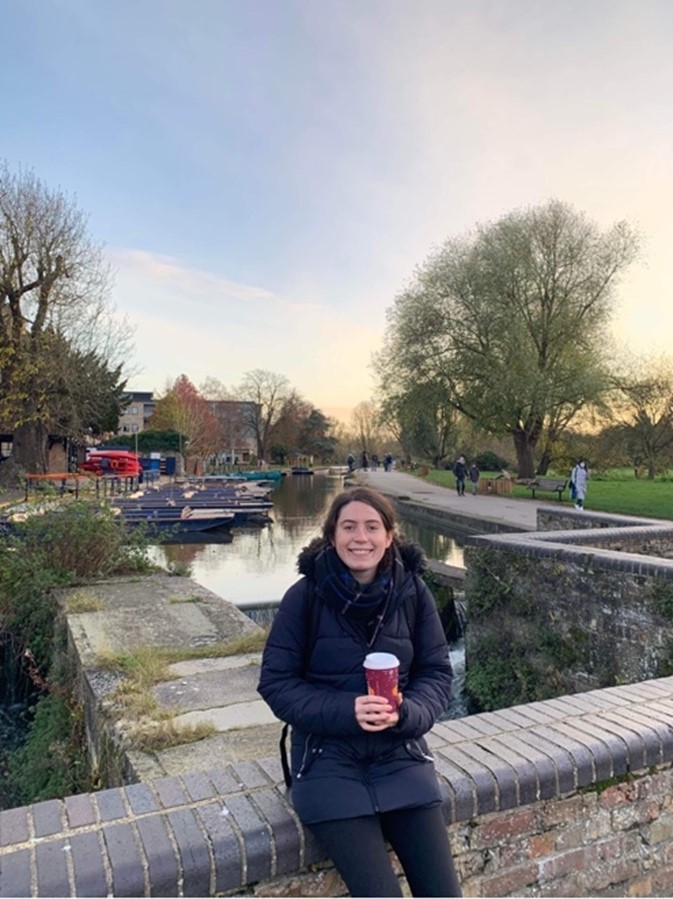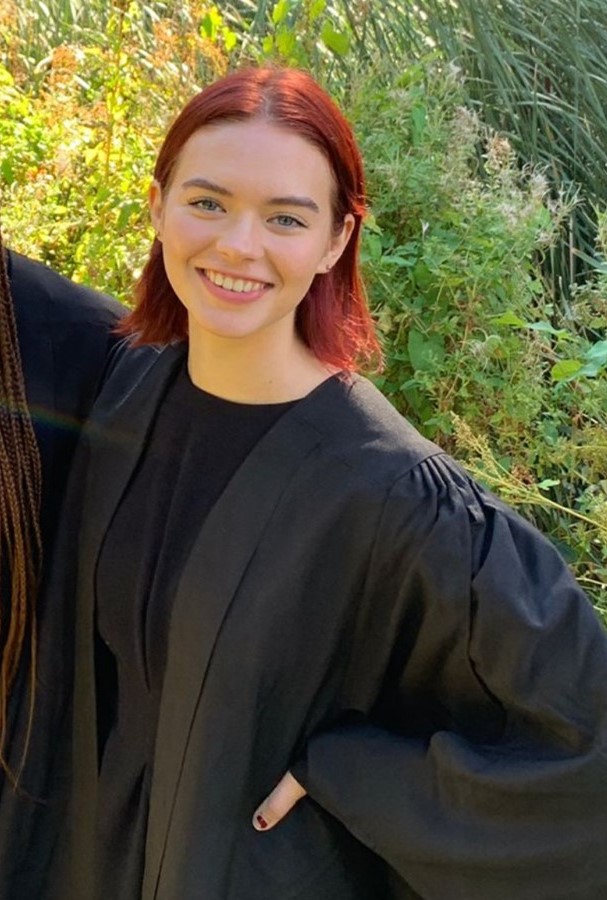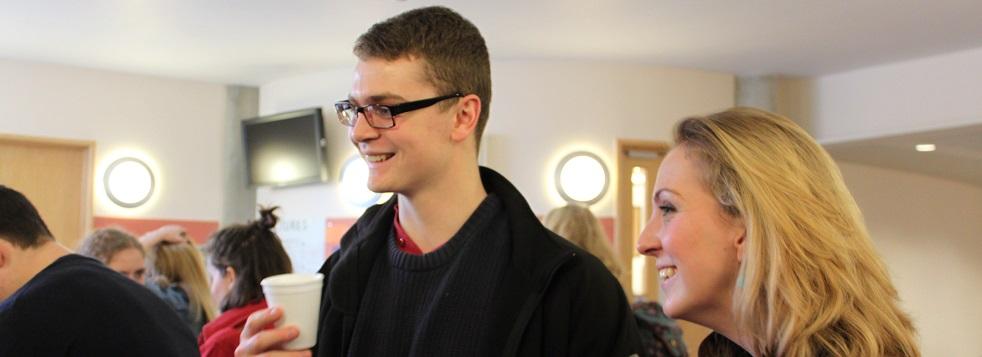
Our course attracts students from all walks of life, and from all religious backgrounds and none. A number of undergraduates on our course have no religious affiliation, and many have never studied religion before.
What they share is a love of learning, a desire to discover more about different cultures, to explore fundamental philosophical questions, and to be challenged and stimulated intellectually.
Despite coming from varied backgrounds, cultures and countries, our students are overwhelmingly positive about their experiences at Cambridge. Over 97% of students report high levels of satisfaction with the course.
If you are wondering whether Cambridge is the right place for you, why not chat to some of our current Divinity Society students or read some of the stories below?
Will I fit in?
I’m Anya and I’m from Bridgend, South Wales. I went to Brynteg Comprehensive School in South Wales, a super friendly and supportive school. I’m now a third year TRPR student and I am planning to do a PGCE in secondary Religious Education next year. I really enjoyed studying my A levels in Sociology, Psychology and Religious Studies and I had brilliant teachers!
I was very concerned about coming to Cambridge and studying TRPR because I expected most students to be privately educated and very self-confident. Some of my assumptions were right, although I also have met lovely people with similar and different backgrounds to myself.
I was particularly concerned about the TRPR requirement of studying an ancient language as the only GCSE languages I have are English and Welsh! To my surprise, New Testament Greek has been an area of study which I have found to be one of the most rewarding parts of my course. I feel very strongly that Cambridge should be accessible to all, no matter your social background!
As well as studying, I volunteer with Student Community Action (SCA) and I am the social officer of the Gonville and Caius Allotment Society. Through these societies I have also been able to find wonderful like-minded friends while also giving back to the community. If you are from a state school and wonder whether you should apply, give it a go and it will be worth it!
Will I manage the workload if I went to a non-selective state school?
I studied at non-selective state schools, Todmorden High School and Rochdale Sixth Form College, before coming to Cambridge to study TRPR and was both excited and nervous about beginning my studies here. I had some concerns about being able to manage the workload and feeling out of my depth academically, as well as some general fears about fitting in. However, having now finished my first term and begun my second, I have been relieved to find that I shouldn't have had so many concerns! My DOS has provided amazing support throughout the transition to university-level study, and I have found the teaching at the Faculty of Divinity interesting throughout. Although the workload can feel challenging, being able to spend time with other students who are also passionate about their subject and engage with academics in the field so regularly is wonderful.
How can I decide between studying Religion, History or English?
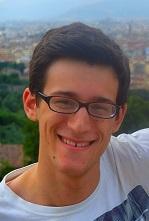 I’ve always been fascinated by religion, but I also loved studying History and English Literature. However in Lower Sixth I realised that the one thing that united my A-level subjects (apart from Maths) was the theme of ‘religion’ and I realised that a Theology degree at Cambridge would enable me to pursue my interest in literature (for example in the first year paper on the Old Testament or the second year paper on Religious themes in Literature) and History (for example A4 and other second and third year papers) whilst focusing on a core interest of mine, namely religion.
I’ve always been fascinated by religion, but I also loved studying History and English Literature. However in Lower Sixth I realised that the one thing that united my A-level subjects (apart from Maths) was the theme of ‘religion’ and I realised that a Theology degree at Cambridge would enable me to pursue my interest in literature (for example in the first year paper on the Old Testament or the second year paper on Religious themes in Literature) and History (for example A4 and other second and third year papers) whilst focusing on a core interest of mine, namely religion.
I realised that if I did a History or an English degree, there would be papers that simply wouldn’t interest me such as medieval poetry or economic history, and in many universities there wasn’t really a way to avoid choosing these papers as they all formed compulsory parts of the degree. Theology at Cambridge was different in that because all the papers, regardless of discipline, centred on religion, I knew I would be very interested in the papers.
I also saw this degree as highly important and relevant for modern society, as Religion plays such an important part in not only the history of civilisations but also in the contemporary ethics and debates of today. Issues such as Fundamentalism, Religious identity, sacred texts and inter-religious dialogue are pressing topics that are discussed in the political and social forum in today’s world.
The interdisciplinary nature of the course really is a major selling point. Theology at Cambridge is more like an American Liberal Arts degree where you can have a remarkably broad skill set in a range of humanities, such as philosophy, literary theory and sociology, whilst also specialising over your three years.
The ability to learn an ancient language is also a great thing about the Cambridge degree, as it enables you to approach a sacred text in its original form, which greatly enlightens the interpretation and discussion of the text.
Will I be out of my depth?
I went to a London comprehensive state school, and I was definitely nervous about applying to Cambridge! Coming for my interview was fairly daunting, with everyone seeming to know what they were doing while I got completely lost around Cambridge! Honestly, the first few weeks were intimidating, but once I got settled in, everything felt a lot less scary, and I realised almost everyone feels the same! Once you know your way round, Cambridge is a lot smaller than you think.
Theology is such a fascinating, engaging, and varied course, with something for everyone. Its such a privilege to study in this amazing place, even though, of course, it can be challenging! I’m so glad that I applied and put myself out there, because I’ve had such an incredible and fun time so far.
Will the teaching suit me?
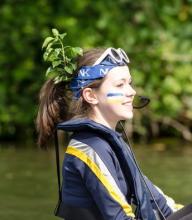
The teaching style at Cambridge differs greatly from that at school, mainly because you are frequently your own teacher! Fortunately you aren't completely left to your own devices, as formal instruction takes place in the form of lectures, classes and supervisions.
Supervisions are the most unique and exciting part of the Cambridge learning experience - a one-hour audience with an expert in your subject. You generally have 6 supervisions per paper, so you average 1-2 supervisions per week. In preparation for a supervision, you will read articles and books from a reading list relating to an essay title your supervisor will give you. Your weekly essay will need to be approximately 1500-2000 words, and you will have around a week to complete it.
The supervision itself will take place either one-on-one with your supervisor, or with 1 or 2 other students joining you. The supervisor, having read all of your essays, will discuss them with you and raise points that you may not have considered, enriching your knowledge of the subject area and making you eager to read more around the issue in question. Supervisions soon become enjoyable; there is something very rewarding about researching a topic independently, and putting forward personal opinions to your supervisors (which sometimes differ greatly from their own!).
Each paper (module) you take, bar the compulsory language paper in first year, generally has one fifty-minute lecture per week, where a lecturer will give a presentation to everyone taking the paper on an aspect of the paper. Additionally, most of the papers have around 4-8 classes, which take place across the term. Classes are attended by all students of the particular paper, and focus on certain subject areas.
The language paper is taught through 2-3 classes per week, of anything between 2-15 people on average, depending on how popular the language is in your year. These classes tend to focus on translation exercises and grammar.
It takes a while to get used to the unusual arrangement at Cambridge, but your college Director of Studies will help you greatly at the beginning with advice on time management and what supervisors expect. Given the small amount of contact time during the week, you do have to structure your hours wisely, researching for your essay and practising your scriptural language. The varied and fascinating subject matter of the course means that those hours go incredibly quickly!
What will my days be like?
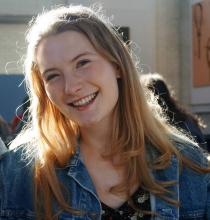 My day usually starts by getting up at around 9, unless I have an early lecture. I will meet a friend and walk to the Divinity Faculty library; here I will work on my current essay. Because I know that I work best in the morning I will try and get the bulk of my work for the day done here (you soon realise after a few terms at Cambridge when and where you work best!)
My day usually starts by getting up at around 9, unless I have an early lecture. I will meet a friend and walk to the Divinity Faculty library; here I will work on my current essay. Because I know that I work best in the morning I will try and get the bulk of my work for the day done here (you soon realise after a few terms at Cambridge when and where you work best!)
At 11am, I head down to the reception area of the faculty for coffee. Postgrads of the department put coffee on every day and this is a great chance to catch up with friends, or meet new people who are also studying, teaching or working within the faculty.
After more private study in the library and a lecture in the early afternoon I will head back to college to have lunch with friends. I like to go to the gym or go for a cycle or to a dance class after lunch, otherwise I might be tempted to do something unproductive like take a nap or watch too much Netflix… When I get back I will organise lecture notes, and settle down in an armchair to read some more relevant material for the looming essay.
Late afternoons are usually reserved for tea with friends from my college who also study TRPR, this is a chance to talk over aspects of our papers that we are finding difficult or discuss ideas that have developed out of our reading or the lectures we have attended.
In the early evening I will update my blog or do a piece of writing for The Cambridge Student. If my weekly essay deadline is the next day I will probably spend the rest of the evening working, but if not, I will plan what needs to be done tomorrow for my current essay and then go out and socialise with friends.
How diverse is the degree?

